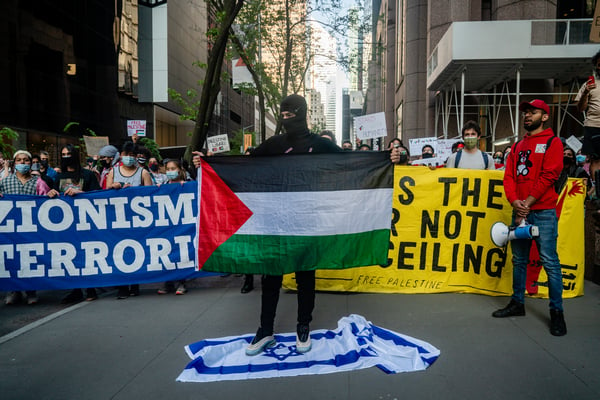Antisemitic incidents in the US have surged by 360 percent since Oct. 7.
By Dion J. Pierre, The Algemeiner
An overwhelming majority of American Jews have reported feeling less safe after Hamas’ massacre across southern Israel on Oct. 7, according to a new survey conducted by the American Jewish Committee (AJC).
Released on Thursday as part of AJC’s “State of Antisemitism in America 2023 Report,” the survey found that over three in four American Jews who had heard about the Hamas terrorist attacks in Israel said the onslaught made them feel a great deal (20 percent), a fair amount (23 percent), or a little (34 percent) less safe as a Jewish person in the United States.
According to the findings, American Jews have dealt with their concerns about safety by carefully managing their ventures into the public, avoiding wearing any apparel or items of clothing that would indicate their Jewish identity, and staying clear of neighborhoods where they are likely to be victims of antisemitic behavior. AJC added that Jews over the age of 30 were more likely to express heightened concerns about their safety post-Oct. 7 than younger Jews, 80 percent compared to 67 percent under age 30.
“It is sadly not surprising that the vast majority of American Jews are feeling less safe today than they did before Oct. 7,” AJC CEO Ted Deutch said in a statement. “In the days, weeks, and months since the terror attack, the world has seen a staggering increase in antisemitic speech, anti-Jewish violence, and demonstrations glorifying Hamas terrorists. How are Jews supposed to feel secure when so many side with the murderers in the wake of the deadliest attack against the Jewish people since the Holocaust?”
On Oct. 7, Hamas terrorists invaded southern Israel from Gaza, murdering 1,200 people and kidnapping 240 others as hostages.
AJC’s survey of Jewish adults was conducted by the independent research firm SSRS from Oct. 5 to Nov. 21.
The release of the results coincided with new data and reports showing that concerns about rising antisemitic hatred in the US are empirically supported.
This week, authorities in Colorado reported that dozens of bomb threats were sent to synagogues, as well as public schools, across the state. Meanwhile, the city of Philadelphia experienced a record-high number of antisemitic hate crimes in 2023, surging by 237 percent, according to data from the California State University, San Bernardino’s Center for the Study of Hate and Extremism. The news outlet Axios was the first to report on the anti-Jewish hate crime surge in Philadelphia.
“It is a very scary time to be a Jew anywhere in the world, but specifically in the US and there is a lot to do as far as countering antisemitism and keeping America as a beacon of hope as it has always been for Jews,” a survey participant told the American Jewish Committee. “This recent terrorist attack by Hamas has shaken us to the core.”
Another participant said, “I am shocked by the sizable vocal minority that is supporting Hamas. In many ways, I don’t feel comfortable living in my country for the first time in my life.”
Antisemitic incidents in the US have surged by 360 percent since Oct. 7, according to the Anti-Defamation League (ADL), which counted 3,283 in the ensuing three months. That total included 553 vandalisms and 60 assaults. Educational institutions in the US have also seen a rise in antisemitic incidents — 505 took place on college campuses and 246 at K-12 schools.
“In this difficult moment, antisemitism is spreading and mutating in alarming ways,” ADL CEO Jonathan Greenblatt said in a statement. “This onslaught of hate includes a dramatic increase in fake bomb threats that disrupt services at synagogues and put communities on edge across the country.”


